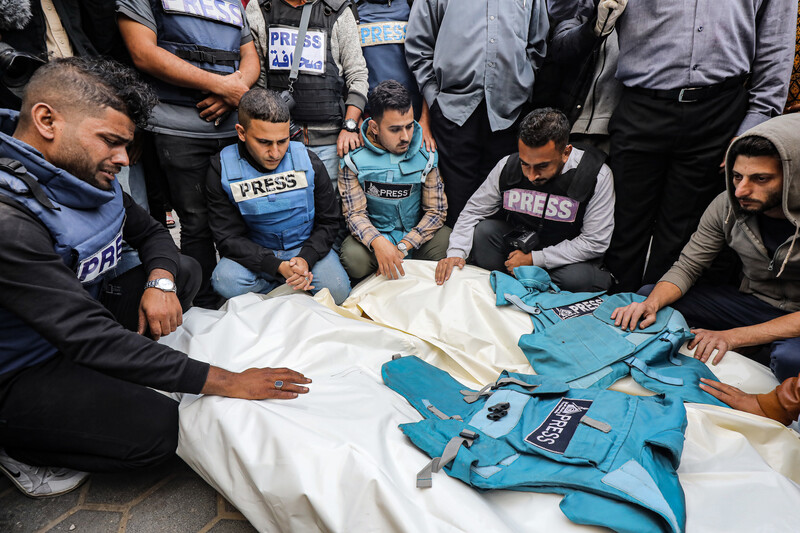Khalid and Salah Jadallah were twin brothers who “seemed to do everything together,” writes Amjad Ayman Yaghi from Gaza. “They were both killed by Israel in an airstrike on the Sheikh Radwan area of Gaza City.”
Khalid and Salah Jadallah were twin brothers who “seemed to do everything together,” writes Amjad Ayman Yaghi from Gaza. “They were both killed by Israel in an airstrike on the Sheikh Radwan area of Gaza City.”
Israel’s national broadcaster Kan published a video of Israeli children singing in celebration and support for the Israeli army’s mass extermination campaign of Palestinians in Gaza. “Autumn night falls over the beach of Gaza, planes are bombing, destruction, destruction,” the children sing in the video. “Within a year we will annihilate everyone, and then we will return to plow our fields.”
Refaat Alareer took shelter in the Rantisi children’s hospital and had seen the basement where the Israeli military filmed an absurd video alleging that Hamas held captives there. “If cooking rice is a Hamas activity, then that was all that was going on in the basement,” Alareer writes from Gaza.

Palestinian journalists mourn over the bodies of their colleagues Sari Mansour and Hassouneh Salim, killed in an Israeli airstrike the previous day, during their funeral in Deir al-Balah, central Gaza, on 19 November.
APA images
In a meeting with lawmakers, Iran’s foreign minister said that Palestinian resistance groups in Gaza are “intelligently mounting pressure” on Israel, adding that “there is a lot of unactivated capacity.” In a phone call with his Russian counterpart, Hossein Amir-Abdollahian also said that the US was “adding to the intensity and scope” of the “American-Zionist” war.
Physicians with Doctors Without Borders say that the Nasser hospital in Khan Younis, southern Gaza Strip, is “overflowing with hundreds of patients with burns who must wait for surgical care” after an Israeli airstrike hit an area near the hospital. The doctors reported that 70 people were pronounced dead on arrival. “A total of 122 patients arrived at the hospital in the immediate aftermath of the airstrike,” the international medical organization said. “The medical needs are huge,” said Christophe Garnier, a local project coordinator with Doctors Without Borders. He added that the organization is “ready to scale up its activities” but that they need “basic guarantees of safety and unrestricted access of medical and humanitarian supplies into Gaza.” Garnier said that “a ceasefire is a must, now more than ever, to stop the bloodshed that is happening.”
Dozens of premature infants were evacuated from al-Shifa hospital in Gaza City to the neonatal intensive care unit of a maternity hospital in Rafah in the southern Gaza Strip. Thirty-one babies were transferred along with 16 staff and family members, according to UN OCHA, which added that “the newborns’ condition was rapidly deteriorating in their previous location.” Five infants had already died in previous days due to the collapse of medical, fuel and electricity services while Israeli forces besieged the facility. UN agencies and partner organizations are “supporting the identification and registration of the babies to help trace and reunify them with their parents and family members where possible,” the UN said. The Palestinian health ministry in Gaza reported that more than 250 patients who were unable to evacuate remain in al-Shifa hospital.
Approximately 70,000 liters of fuel entered Gaza from Egypt, which is “well below the minimum requirements for essential humanitarian operations,” the UN Office for the Coordination of Humanitarian Affairs said. UNRWA, the UN agency for Palestine refugees, and the UN children’s fund UNICEF “distributed 19,500 liters of fuel to water and sanitation facilities [in southern Gaza] enabling them to operate generators and resume their operation.” This amount of fuel is expected to last for around 24 hours, the UN said. In Gaza’s northern half, “all water and sanitation facilities are presumed to be shut down” and there has been no distribution of bottled water since Israel’s ground invasion began late last month, “raising grave concerns about dehydration and waterborne diseases.” The UN stated that apart from the fuel trucks, 69 trucks carrying humanitarian supplies entered Gaza from Egypt.
Israeli forces continued to order Palestinians in the northern half of the Gaza Strip to move south through a “corridor” between 7:00am and 4:00pm. UN OCHA estimates that approximately 20,000 Palestinians used donkey carts, buses or walked on foot, with some Palestinians being arrested by Israeli soldiers as they moved. The UN estimates that more than 1.7 million people have been internally displaced in Gaza, including nearly 900,000 who are staying in 154 UN shelters. Such shelters “are accommodating far more people than their intended capacity and are unable to accommodate new arrivals,” the UN stated. Thousands of internally displaced persons “are seeking security and safety by sleeping against the walls of shelters in the south, out in the open.” Overcrowding in these shelters “is contributing to the spread of diseases, including acute respiratory illness and diarrhea, prompting environmental and health concerns,” the UN added.